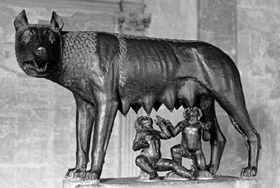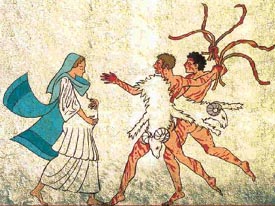|

Lupercalia: Before Valentine's Day
— Brenda Sutton

Brenda Sutton, Event Coordinator for Mythic Imagination Institute, is an award-winning
singer/songwriter who performs with the internationally acclaimed band Three Weird Sisters
and the Weird Family. She is also the high priestess of the
Oak Spring Covenstead in Decatur, Georgia. She is the publisher of Mythic Passages and a freelance writer and editor.

February, the month of love. We owe our red satin hearts of chocolate and sentimental cards to much older practices.
The Parentalia is one of three Roman festival honoring and appeasing parents who have died. Families gathered together at tombs and sepulcres
of their fathers and mothers. Graves were adorned with boughs of greenery, and gifts of wine and food were offered up in sacrifice to souls of their
ancestors. The Parentalia started on the Ides and lasted until the 22nd. During these celebrations all temples were closed, marriages were forbidden,
and no business transactions could take place. Peace, love and the household gods were celebrated on February 13th. The second day of Parentalia,
February 14th was dedicated to the Juno-Lupa, the she-wolf who suckled Romulus and Remus.

Young men and priests called Luperci dressed themselves in the bloody skins of sacrificial goats. In an act of purification, they then ran
a course through the city of Rome from Juno-Lupa's Cave around the Palatine Hill. Any women lucky enough to encounter the Luperci
during the run were struck with strips of goat skin ("februa") to promote fertility. Shakespeare used this rite in Act I, Scene II of
Julius Caesar when, during the feast Caesar says to Antonius:
Forget not, in your speed, Antonius, to touch Calpurnia; for our elders say, the barren, touched in this holy chase, shake off their sterile
curse.
On February 15th, the second day of Lupercal and the third day of Parentalia dedicated to Juno Februata (Juno the Fructifier),
the Romans played out a rite of Romantic Roulette. The Luperci drew the names of young women from a box. Thus paired by the gods,
the couples remained paired until the following Lupercalia. Our modern Valentines' rituals don't hold a candle to these rites!
In 496 A.D. Pope Gelasius ended this Lupercalian Lover's Lottery. In an attempt to move away from the pagan celebration of
fertility, he selected Valentine as the new patron saint of lovers and set his feast day on the fourteenth of February. The church's version replaced a
lottery of lovers with a lottery of Saints. Instead of drawing the name of a nubile young maiden from a box, Christians pulled the name of a saint. The
next year was then dedicated to the emulation and study of that saint's virtues. Not very romantic. And not very popular either. The church gave
up on this practice after few hundred years, returned to pairing up eligible bachelors with pious virgins in the 15th century. Young men wore the name
of their selected Valentine on their sleeves for a year (the origin of wearing one' heart on one's sleeve). In the 16th century, the church
tried jump start the old Saint's Lottery once again, but this ritual never really captured the hearts of their congregations.
The Carista, the second of three rites to honor the dead, was essentially a family renunion. The living who had paid their respects to
the dead during the Parentalia, gathered together, resolved outstanding disputes, and celebrated their family. Everyone brought a dish to the meal,
potluck style. Sacrifices were made to the personal and family gods collectively called the Penates and the Lares." One had to do
something terribly shameful to be excluded from participation in the Carista.
On February 21st,the ongoing celebrations forming part of the dies parentalis and the tempus religiosum came to a close. The Feralia,
a religious holiday sacred to Jupiter Feretrius, was described by Ovid as a darker magical rite wherein sheep were sacrificed to the spirits of the dead. Finally
appeased, the dead would continue to work for the benefit of the living, and business could resume.
So, what was once a month-long series of rites that blessed lovers, friends, family and ancestors is now wrapped up in a pretty red bow with a
chocolate kiss. All things change with time, but one good part of Lupercalia remains in our modern celebration of Valentine's Day. Love still holds its
place at the center of this popular holiday.
Return to Passages Menu
Subscribe to the Passages e-newsletter
|

